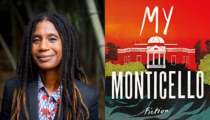With all of the bombing and explosions and smoke everywhere,…

On Naming and Lessons Learned
I have been thinking a lot about grief and love, having recently lost three of my most beloved and influential Black women elders, beginning with bell in December of 2021 and then my paternal grandmother, Gloria Evadne Atherton on March 18, 2022, and four days later, my paternal aunt, my Auntie Karen Marie Mason.
I have been thinking about how difficult and inspiring it has been to really come to grips with how someone you love deeply can be loved as deeply by anyone other than yourself and that this person might have loved others just as deeply, in ways and moments that you will never experience, but in ways that have felt as much like a communion as yours. This has been one of the most surprising aspects of the grief experience I’m having now: to come to terms with the breadth of my loved ones’ love with others.
I first came to knowledge of bell hooks as a student at Spelman College. I read All About Love and attended a talk she gave there in 2004, where she mentioned something offhanded and shocking about anal sex and I, prude that I was at the time, decided I was good on that, lady.
I later relied on her heavily in my dissertation work on Simone de Beauvoir, Black feminism, and the erotic, but can’t say that I had any strong desire to know her. I respected the fact that she was a Black woman philosopher who took the subject of love seriously and was courageous enough to write about it directly.
When I applied to the job at Berea, bell’s connection to the college was unclear to me, so I was embarrassed and underprepared when she turned up on my computer screen during my Skype job interview, asking me the meaning of the phrase “feminism is for everybody.”
I must have responded well enough somehow because I got the job and she invited me and my mother—who she always insisted on referring to as “cute mom”—to the opening of The bell hooks Institute in 2015, and she introduced me to people as if she already knew me well and we got to sing songs in the dark with Laverne Cox when the lights went out at the reception at the dean’s house, who had llamas. I think she took a shine to me because of our shared love and respect for Simone de Beauvoir, who I knew she looked up to and read as a young woman. It might have been for that reason that she insisted, every time she introduced me to someone, on calling me a philosopher, even though I was teaching at Berea in what was then the Women’s and Gender Studies Program and is now The bell hooks Center.
When I moved my partner at the time from Philadelphia, where we had bars and he had a growing and bright future as a blues-rock musician, to Berea, Kentucky, I honestly didn’t know what I was doing and why.
I told myself there must be some grand lesson I was supposed to learn directly from bell herself. At the time, I convinced myself that it was a spiritual lesson, as I knew her work had been heading in that direction for a while.
Once in Berea, I eagerly accepted any invite to bell’s house, hoping time after time to sit at the feet of a wise feminist sage and soak up her wisdom and brilliance. What I found, largely, to my shock and spiritual chagrin, was a slight, sly, childlike-voiced Black lady sitting on a black leather couch, talking shit. Talking shit about every thing and every body. I quickly came to learn that most anything said to bell might then be repeated to anyone else, including but not limited to the man who cut her yard and the woman who sold mushrooms at the farmer’s market.
After a year or so, she finally told me to come by at a specific time to become a part of “Group” and I started going over her house every Tuesday afternoon, meeting with various numbers and variegated mixtures of local women from Berea to talk about the challenges we faced as women here. Always, when I was a part, it was my sister-friend Adanma and me, sneaking off afterwards to her house a few doors down to smoke and debrief the day’s session, often to her husband Shane’s amused annoyance.
I must say that when I left Berea to take my current job in the Philosophy department at Haverford College outside of Philadelphia, I couldn’t figure out what lessons I had learned from bell. I had met a lot people. I had taught her work. I had read as much as I could in the archives. I had come to love her. And I had asked her a lot of questions. A LOT of questions. But when I left, I still felt I had failed in getting my lesson, especially if it was supposed to have been one of the spirit.
I’ve realized now that some lessons you only really get in retrospect and sometimes when someone’s presence becomes a physical absence, that’s when the lessons actually begin.
So here are a few that I have learned and continue to learn from bell:
The first is the value of naming, of naming systems, of naming oneself. bell believed in the power of the word. So much so, as we know, that for the majority of her adulthood she chose to be called by a name that she herself had taken up, one that connected her to her maternal line, one that she insisted would buck the conventions of the English language in order to take the focus off of herself and put it on the message. We disagreed over and over again about the efficacy of the term “intersectionality,” which I held was useful for its ambiguous ubiquity and which bell said, for those very reasons, could not do the same crucial work as her chosen “imperialist white supremacist capitalist patriarchy,” which was clear to name and call out those specific systems from which we must work to free ourselves.
I now realize, in her insistence to call me a philosopher over and over again, that bell also wanted me to name myself. She writes in her essay “Beauvoir and Bell: True Philosophers,” “In the racially segregated world of my growing up, the only time I heard the word ‘philosopher’ was when I was mockingly called by that sobriquet when I was being deemed too ‘serious’ about the world of ideas. Although I never told anyone, it gave me great pleasure to be called a philosopher, when I learned that the root meaning of the word was ‘lover of wisdom.’”¹
She wanted us to share that claim to wisdom, that claim to philosophy. She wanted me to announce myself, to take up the name that had been so often denied to Black women thinkers like us.
In August 2020, our first pandemic summer, bell allowed me to spend a week with her, recording between twenty minutes and an hour and half most days, of interviews with her about her work and her life. Each day, me and my lover-cum-audio engineer sat with her in her home, bringing her offerings of trinkets and food. Her health was not good so my friend Kevin, a healer, sent me with some honey and a comb and had me bring her specific flowers. Despite this, though, bell was mischievous in her answers to my questions, making me work hard, often seeming to suggest that the answers had already been given. She was always like this, redirecting the conversation if it bored her and pointing everyone back to her work.
I have also come to learn that coming to know someone is trying to build a context around the complexity of their being. Here are things that I witnessed bell struggled with while I knew her: forgiveness, regarding and honoring the feelings of others, loneliness, suicidal ideation, keeping people’s confidences/secrets, a sometimes miscalibration of the meaning and persistent need for “talking back,” not always accepting and receiving love and care offered to her. I meditate, with bell as an ancestor, on these struggles, some of which I share, and ask for the wisdom to heed her example in its fullness, maybe even to enact some of the lessons she didn’t or couldn’t.
bell was generous. She gave of her time and she gave, I am coming to understand more and more, as more and more people describe to me how close they feel to her, how she saved their lives, she gave of herself. I think often about all the projected lovelessness and invisibility and silences that bell shouldered in her mission to rid her life of hers as an example of how we might rid our lives of ours.
When I received a few calls in December that bell’s time was coming close, I hopped in my car and drove from Philly to Berea, hoping to have the opportunity to ask bell more questions. I thank Dr. Valeria Watkins, bell’s sister, for allowing me to spend time with bell in her last days, as she faded from consciousness. I tried to sneak in at least one more question. I asked, “So what have you been thinking about?” Like always, she answered in the most bell way possible: “Life.” And then, despite the fact that it labored her to be in conversation, asked me “Whatever happened to that lover-cum-audio engineer?”
I can now see that when we were chatting shit in her living room, I was, in fact, only beginning to get my lesson. I thought I was looking for a lesson that I could recognize as such, but instead I am only really coming to understand the things I actually did learn from her. That they were, in fact, lessons of the spirit.
Someone suggested that I should leave you with a takeaway, some kind of praxis, what hearing me talk about bell should encourage you to do. I can only suggest that you do as I am committed to doing: continue to learn your lessons from bell. David Whyte writes that “the death of anyone close to us is always a form of salutation, a simultaneous goodbye to their physical presence and a deep hello to a more intimate imaginal relationship now beginning to form in their absence.”²
If you are one of the many thousands of people who formed a relationship with bell, whatever form it took, whatever kind it was, continue to nurture that relationship. Continue to engage her work and to teach her work and to be critical of her work. Continue to hear her voice talking shit in your ear. Continue to support the efforts of those who, like myself, are committed to protecting and continuing bell’s legacy. And when given an opportunity to do so, name yourself.
1 hooks, bell, “Beauvoir and Bell: True Philosophers,” in Beauvoir and Western Thought from Plato to Butler, ed. William S. Wilkerson and Shannon M. Mussett (Albany: State University of New York Press, 2012), 229.
2 Whyte, David. Crossing the Unknown Sea: Work as A Pilgrimage of Identity (New York: Riverhead Books, 2002), 46.



